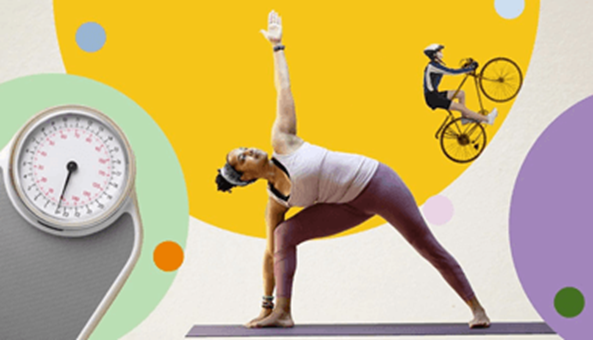Living a healthier life isn't just about running to the gym or counting calories. It’s about creating a lifestyle where food and exercise work together to make you feel energized, strong, and alive. But let’s face it, between work, family, and just keeping up with life, how do we make it all happen without feeling overwhelmed?
Let’s break it down in a way that’s realistic and easy to understand: eat, move, and thrive. These aren’t just buzzwords; they’re the pillars of a healthy, balanced lifestyle that doesn’t require you to be perfect, but rather to be consistent in a way that feels good.

- 🔥 Eat: Fuel Your Body, Don’t Punish It
- 1. Eat a Variety of Whole Foods
- 2. Keep Your Portions in Check
- 3. Hydrate, Hydrate, Hydrate
- Move: Get Your Body Going
- 1. Find Activities You Actually Enjoy
- 2. Make Movement a Part of Your Day
- 3. Don't Overdo It
- Thrive: The Mind-Body Connection
- 1. Prioritize Sleep
- 2. Manage Stress
- 3. Celebrate Your Progress
- Conclusion: A Life Well Lived
💡Tip: This post may contain affiliate links. We may earn a commission if you make a purchase through these links, at no extra cost to you.
Eat: Fuel Your Body, Don’t Punish It
We all know food is important, but there’s so much information out there, it can be hard to know where to start. Should you go keto? What about intermittent fasting? Or maybe just eat less sugar?
The truth is, you don’t need to be on a special diet to live healthily. What’s important is finding balance in what you eat and treating your body like the temple it is.
Think of food as fuel. Just like a car needs the right kind of fuel to run efficiently, your body needs the right mix of nutrients to perform at its best. That doesn’t mean you can’t indulge occasionally—pizza night is a celebration, after all—but it does mean you need to get the essentials right most of the time.
Eat a Variety of Whole Foods
Aim for meals that include vegetables, fruits, whole grains, and lean proteins. Why? Because each food group offers unique nutrients that your body needs to function optimally. Vegetables and fruits are packed with vitamins and minerals, whole grains provide fiber, and lean proteins help build and repair muscles.
You don’t need to overthink it. A simple stir-fry with chicken, broccoli, and quinoa, or a salmon salad with leafy greens, avocado, and a drizzle of olive oil can do wonders for your body.
Keep Your Portions in Check
Portion control doesn’t mean deprivation—it means balance. You don’t need to measure everything out, but try to listen to your body. Are you still hungry after a meal? Then go ahead and have a little more. But are you eating just because food is in front of you? Learn to recognize when you're full.
Your body knows what it needs, and with a little practice, you’ll get better at reading its signals.
Hydrate, Hydrate, Hydrate
Water is life. We all know we should drink more of it, but why is it so important? Proper hydration keeps everything in your body running smoothly—your muscles, your brain, and your metabolism all thrive when you’re properly hydrated.
Start your day with a glass of water, and try to keep a bottle with you throughout the day to sip on. It’s a small change, but it will make a big difference in how you feel.

Move: Get Your Body Going
Exercise isn’t a punishment. It’s not about torturing yourself on a treadmill for an hour every day. It’s about moving your body in a way that feels good and gets you stronger, more flexible, and energized. And it doesn’t matter how old you are or how fit you think you are—there's always room to improve.
Find Activities You Actually Enjoy
Let’s be honest: if you don’t like running, you’re not going to stick with it. But that doesn’t mean you’re doomed to a sedentary lifestyle. You might love dancing, cycling, yoga, or hiking. Or maybe it’s weightlifting or swimming that gets you excited. The key is to find something you actually look forward to, rather than dreading every workout.
Try different things until something clicks. Working out shouldn’t feel like a chore; it should feel like a way to take care of yourself.
Make Movement a Part of Your Day
You don’t have to carve out an hour at the gym to stay healthy. Small, consistent efforts add up. Take the stairs instead of the elevator. Walk or bike to the store instead of driving. Even a 10-minute walk after lunch can make a difference.
The key is to make movement a natural part of your life. It doesn’t need to be a formal “workout,” just keep moving.
Don't Overdo It
The best workouts are the ones you can keep doing consistently. If you’re pushing yourself too hard every day, you’re setting yourself up for burnout. Take rest days. Stretch. Listen to your body when it needs a break. Exercise isn’t about punishing yourself—it’s about strengthening and supporting your body.

Thrive: The Mind-Body Connection
Eating well and exercising regularly are both important for your physical health, but your mind plays a huge role in all of this, too. Mental health and physical health go hand in hand—without one, the other can’t truly thrive.
Prioritize Sleep
If you’re not getting enough sleep, everything else falls apart. Sleep helps your body recover, keeps your mind sharp, and supports your immune system. When you don’t sleep enough, you’re more likely to feel sluggish, make poor food choices, and skip workouts.
Aim for 7-9 hours a night, and create a relaxing bedtime routine that helps you wind down. Your body and mind will thank you.
Manage Stress
Stress can impact your health in a big way. It can lead to overeating, disrupted sleep, and even physical pain. Finding ways to manage stress is crucial for overall well-being.
This could mean practicing mindfulness, deep breathing exercises, or taking up a hobby that helps you unwind. If you’re not sure where to start, consider starting with something as simple as taking five deep breaths when you feel overwhelmed.
Celebrate Your Progress
Thrive doesn’t just mean pushing yourself to do more. It means celebrating where you are right now. Notice the small wins—whether that’s walking an extra mile, cooking a healthy meal, or simply taking time for yourself. These are the moments that keep you going.

Conclusion: A Life Well Lived
Health isn’t about extremes. It’s about finding a balance that works for you. Eat to fuel your body, move in a way that feels good, and take care of your mind. When you take care of yourself holistically, you’ll feel stronger, happier, and more connected to your body.
And remember—no one’s perfect. Some days you might eat pizza and skip a workout. But that’s okay. It’s about the bigger picture and the small, consistent choices that add up to a healthier, happier you.
So, eat well, move often, and thrive. It’s your life—make it one you truly enjoy.
0 Comments
Your comment is awaiting moderation.